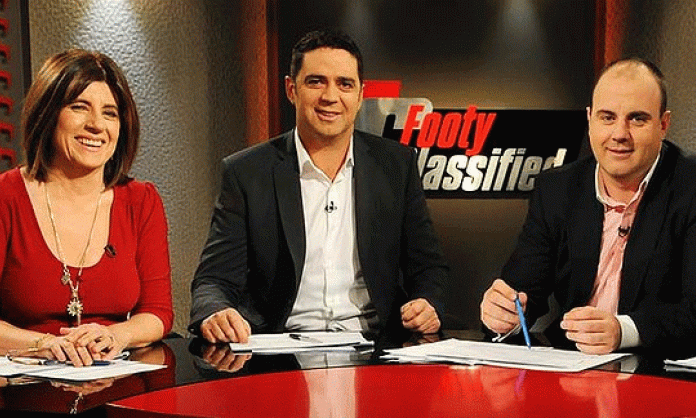The juxtaposition couldn’t have been starker. The day before Ian Thorpe’s “coming out” in an interview with Michael Parkinson, we saw yet another incident of blatant homophobia in the AFL – this time from Channel 7 and 3AW commentator Brian Taylor.
Taylor was on-air as part of Channel 7’s pre-game coverage of the 12 July match between Carlton and Sydney when he labelled Geelong player Harry Taylor a “big poofter”. It was Taylor’s manner of waving to the crowd that Taylor objected to, describing it as a “royal wave”.
Taylor has form. In June he disparaged fellow 3AW commentator Seb Costello’s dress sense. “I don’t want to offend his upbringing or his parents, but he looks gay,” he said.
The response to his 12 July remark was swift. As outrage spread across social media, Taylor made an on-air apology during the half-time break. Specifically, he apologised to “anyone, and particularly Harry and any of his friends, that were offended by the remark.”
Channel 7 announced that Taylor had been “censured” and that he would receive counselling and education to ensure it didn’t happen again. 3AW suspended him from Sunday football commentary. Everyone agreed that the remarks were “stupid” and “unacceptable” and that there’s no place for homophobic attitudes in the AFL.
Yet within two days the emphasis shifted. Taylor came to be portrayed more and more as the victim. The fact that public outrage wasn’t quelled by his prompt apology, or the “punishment” dished out by his employers, was enough to get under the skin of the football commentariat.
3AW’s own enfant terrible Neil Mitchell led the backlash: “There’s a lynch mob after our own Brian Taylor for calling a footballer waving to the crowd a ‘big poofter’. It was a stupid and offensive thing to say, but back off with the lynch mob. This lynch mob mentality is starting to annoy me. It’s a bit fashionable to have a lynch mob when someone says something wrong.”
Get it? Brian Taylor is like a young black man living in 1930s Mississippi surrounded by a crowd of enraged whites ready to string him to the nearest tree. Mitchell and other conservative commentators are akin to the “freedom riders” – venturing into the Deep South of political correctness.
Mitchell was far from alone in decrying, more or less explicitly, what was regarded as an “over the top” reaction to Taylor’s remarks. On Channel 7’s Talking Footy program, screened on Tuesday 15 July, the panel made the most cursory of references to the fact that Taylor’s comments were “out of line”, before admonishing, in suitably diplomatic language, those who couldn’t seem to accept that his apology was enough.
The panel on Channel 9’s Footy Classified followed suit. The comments were “stupid” and “upset a lot of people”. But again, the real issue by this point had become the impact Brian Taylor’s comments had had on ... Brian Taylor. The panellists “feel for him”. We should recognise that he’s “from a different era”, that his “style is a bit over the top” but that he’s certainly not homophobic and that it was just a “lapse of concentration”. He “works long hours” and should really be “looked after and protected”.
Seriously, let’s cut the crap. Not a single AFL player in the history of the game has had the confidence to openly identify as gay, and this incident is yet another indication of why that might be the case.
Brian Taylor may well be a nice enough person, but there can be no doubt that he was using homophobia in an attempt to garner a cheap laugh from his audience. Potentially worse is that the whole exchange, including the use of the term “big poofter”, was allegedly rehearsed in advance without objection from any of Channel 7’s other panellists or from the producer.
Even if that wasn’t the case, the response of footy’s talking heads to the anger that Taylor has provoked says much about homophobia in the AFL. There’s a clear element of speaking out of both sides of the mouth. On the one hand there’s the “official line” that homophobia of any kind won’t be tolerated. On the other hand there’s a subtle (or, in Neil Mitchell’s case, not so subtle) nod and a wink to the “old fashioned types” who think the whole thing is a bit of a laugh.
The overall message is that while the commentators themselves don’t generally want to be associated with it, they understand that there is a thick vein of homophobia running through AFL culture, and on the whole they’re not overly concerned about it. What they’re more concerned about, when push comes to shove, is that people want to make a big fuss about it.
For LGBTI athletes, whether in the AFL or other sports, it can be rather more difficult to see the humour. A recently released report, Out on the Fields, found that 85 percent of gay athletes have experienced or witnessed homophobic abuse, while half have been the direct target of verbal threats, bullying, violence or exclusion. Out of this half, 13 percent have suffered physical assaults.
This is a reality that the “nudge-nudge, wink-wink” reaction to the Brian Taylor incident contributes to.
Next time a high profile figure in the AFL or any other sport makes a homophobic remark, perhaps we should pay a bit more attention to the impact of such supposed “slip ups” on the experience of LGBTI people, rather than concerning ourselves with how hurt the perpetrator is by the understandable backlash.









